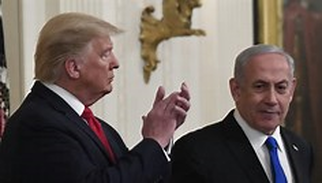Here are the details of President Trump's peace plan as summarized by Jonathan Bernis:
WHAT MAKES A “DEAL OF THE CENTURY”?
If the President’s peace plan were to be accepted by both sides right now, here are some of the major impacts:
- Israel would keep full control of an undivided Jerusalem
- Israel would oversee security from the Jordan River to the Mediterranean Sea
- Israel would annex 20 percent of the land in Judea and Samaria but give up some of its land in the Negev on the Gaza-Egyptian border
- Existing Israeli settlements in the West Bank would be retained but would not be able to expand for four years
- A state of Palestine would be created that comprises 80% of the land of Judea and Samaria, and the new land in the Negev
- The Palestinian state could establish a capital in East Jerusalem outside the Israeli security fence
- The U.S. would open an embassy for Palestine and provide up to $50 billion in economic aid
- The Palestinians would recognize Israel’s right to exist, stop inciting terrorism, stop paying families of terrorists, and disarm the terror groups Hamas and Islamic Jihad
The plan is also good for Israel because, unlike past plans, it recognizes the reality of Israel’s sovereignty and need for security. In his speech, Prime Minister Benjamin Netanyahu made this point.
“For too long, the heart of Israel has been outrageously branded as illegally occupied territory,” he said. “Today, Mr. President, you are puncturing this big lie. You are recognizing Israel’s sovereignty over all Jewish communities in Judea and Samaria – large and small alike.”
NEXT STEPS IN THE PEACE PROCESS
Both Israeli Prime Minister Benjamin Netanyahu and Prime Minister candidate Benny Gantz of the Blue and White party are on board with the plan. Also, unlike proposals in the past, several Muslim nations, including Egypt, Saudi Arabia, Bahrain, and the United Arab Emirates, have offered support for the plan.
One surprising source of opposition is coming from Israeli Arabs whose villages and cities would be moved to the Palestinian state’s territory. They say they want to remain citizens of Israel no matter what. That’s not the attitude usually painted by the media of Arabs living in those areas.
But what it comes down to, as always, is the response from the Palestinian Authority in the West Bank. So far, the PA leader Mahmoud Abbas hasn’t weighed in on the plan, but it is doubtful he will agree. Past leaders have even used the peace process to launch new attacks against Israel.
Even if he does agree, the task of disarming and removing Hamas from Gaza, as well as disarming Islamic Jihad and other terrorist groups, will not be easy.
Thankfully, no matter the outcome of this peace plan, we know that Israel will continue to thrive. It’s economy, culture, technological advancements and military are second to none in the region. Even more importantly, it will remain a safe haven for the Jewish people as anti-Semitism continues to grow around the world.

 RSS Feed
RSS Feed